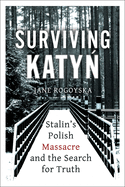
Jane Rogoyska's Surviving Katyń investigates a tragedy that continues to haunt Poland and poison Russo-Polish relations almost a century after it occurred. Rogoyska is a historian, biographer and the author of a novel, Kozlowski, born from her research into the Katyń massacre in 1940, when 22,000 Polish prisoners of war were murdered and buried in secret by the Soviet secret police, the NKVD. Though millions died in World War II, the massacre is notable because the murdered prisoners, largely officers, constituted a significant swath of the Polish intelligentsia, and because of what came after. Soviet officials maintained for half a century that Katyń was a crime committed by the Nazis, a lie that muddied the waters around an already inscrutable tragedy and put Katyń at the heart of difficult questions about politics and historical truth.
At least until the first mass graves were found by the Nazis in Katyń Forest, the remaining Polish officers were left with the mystery of how and where their friends and comrades had disappeared. Rogoyska sensitively recounts how that uncertainty tortured the survivors and the families of the deceased. After the discovery of the bodies, the Soviets and Nazis blamed each other for the killings, and the truth became secondary to their propaganda war.
Surviving Katyń feels remarkably modern not only because the narrative extends to the present day, but because the arguments about the truth of Katyń recall the fake news and conspiracy theories that proliferate today. At a time when even historical facts are disputed, Rogoyska's efforts to get as close to the truth of Katyń as possible are more necessary than ever. --Hank Stephenson, the Sun magazine, manuscript reader

